
Journal of Bioresources and Bioproducts
Scope & Guideline
Unlocking the potential of nature’s resources.
Introduction
Aims and Scopes
- Biomass Utilization and Biorefinery Processes:
Research in this area involves the conversion of various biomass types into valuable bioproducts, including biofuels, bioplastics, and other bio-based materials. This includes the study of thermochemical, biochemical, and enzymatic processes. - Development of Biodegradable and Sustainable Materials:
The journal emphasizes the innovation of materials that are both biodegradable and derived from renewable resources. This includes studies on bioplastics, composites, and new materials with enhanced properties for industrial applications. - Characterization and Application of Natural Fibers:
Investigations into the properties and applications of natural fibers from various sources, including agricultural residues and forest products, are central to the journal's scope. This includes their use in composites, textiles, and packaging. - Environmental Remediation and Sustainability:
Research focused on the role of bio-based materials in environmental remediation, such as wastewater treatment and pollution control, is a key area. This includes the study of biochar, biosorbents, and other materials for environmental applications. - Innovative Applications in Biomedical Engineering:
The journal highlights the development of bio-based materials for biomedical applications, including drug delivery systems, tissue engineering scaffolds, and antimicrobial agents derived from natural sources.
Trending and Emerging
- Nanotechnology in Biomaterials:
There is a notable increase in research focusing on the application of nanotechnology in the development of bio-based materials, particularly in enhancing the performance and functionality of natural fibers and biocomposites. - Bio-based Solutions for Environmental Challenges:
Emerging themes highlight the development of bio-based materials aimed at addressing environmental issues, including pollution remediation and waste management, showcasing the role of biotechnology in sustainability. - Integration of Circular Economy Principles:
The trend towards circular economy principles is becoming more prominent, with research focusing on the valorization of waste materials and the development of processes that minimize waste and maximize resource use. - Smart and Responsive Materials:
There is an increasing interest in developing smart materials that can respond to environmental stimuli. This includes research on stimuli-responsive polymers and composites that have applications in various high-tech sectors. - Hybrid and Composite Materials for Enhanced Performance:
The trend towards hybrid materials that combine multiple bio-based components for superior performance is rising. This includes the use of nanofillers and other additives to improve mechanical, thermal, and barrier properties.
Declining or Waning
- Traditional Wood Processing Techniques:
Research focused solely on conventional wood processing methods seems to be declining. This shift may be due to the increasing interest in advanced materials and nanotechnology applications that offer enhanced properties and sustainability. - Single-Use Bioplastics:
The focus on single-use bioplastics is diminishing as the industry moves towards more sustainable solutions that emphasize recyclability and multi-use applications. This reflects a broader trend towards reducing plastic waste. - Basic Characterization Studies without Application Context:
Studies that primarily focus on the basic characterization of materials without linking to practical applications are becoming less frequent. There is a growing expectation for research to demonstrate real-world applications and impacts.
Similar Journals
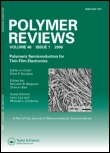
Polymer Reviews
Illuminating the path of polymer research.Polymer Reviews, published by Taylor & Francis Inc, is an esteemed journal dedicated to the intricate and evolving field of polymer science. With its ISSN 1558-3724 and E-ISSN 1558-3716, the journal has established a significant presence among researchers and practitioners alike, evidenced by its impressive categorization in the Q1 quartiles across multiple disciplines, including Biomedical Engineering, Materials Chemistry, and Renewable Energy. Since its inception in 2006 and continuing through 2024, Polymer Reviews has consistently aimed to advance the knowledge base of polymer applications and innovations, providing a platform for comprehensive review articles that stimulate further research and inspire practical solutions. The journal, ranking within the top percentile across several Scopus categories, underscores its impact and relevance in a rapidly developing scientific landscape. Though not an open-access journal, it remains a vital resource for those invested in the future of materials science and engineering.

CELLULOSE CHEMISTRY AND TECHNOLOGY
Exploring the Future of Sustainable MaterialsCELLULOSE CHEMISTRY AND TECHNOLOGY, published by EDITURA ACAD ROMANE, is a pivotal journal in the fields of materials and organic chemistry. With a unique focus on cellulose and its derivatives, this journal explores innovative research and developments that contribute to sustainable materials science. Established in 1972, it boasts a rich history of publication, aligning closely with advances in green chemistry and bio-based materials. Recognized with a Q3 ranking in both Materials Chemistry and Organic Chemistry, the journal provides a platform for researchers to disseminate valuable findings that push the boundaries of cellulose applications. Despite its non-open-access status, it remains an essential resource for academics and professionals seeking authoritative content in cellulose science. With relevant insights into the changing dynamics of materials research, CELLULOSE CHEMISTRY AND TECHNOLOGY serves as a critical link for ongoing discussions in the scientific community, proposing solutions and exploring new avenues for cellulose utilization.

BioResources
Transforming waste into opportunity through cutting-edge research.BioResources is a pioneering open access journal launched in 2006, dedicated to disseminating knowledge at the intersection of bioengineering, environmental engineering, and waste management. Published by NORTH CAROLINA STATE UNIVERSITY DEPARTMENT OF WOOD & PAPER SCIENCE, this journal serves as a vital platform for researchers and professionals to explore the sustainable use of biomaterials and renewable resources. With an impact reflected through its Scopus rankings, including a respectable position in the 2023 quartile rankings across several relevant categories, BioResources is committed to advancing scientific discourse and enhancing the understanding of bioresource utilization. The journal not only supports high-quality research but also encourages contributions that shape environmental policies and practices. Accessible globally, it invites active participation from scholars aiming to contribute to a more sustainable future. Researchers, professionals, and students alike will find valuable insights and groundbreaking research within its pages as it continues to foster knowledge and innovation in the field.
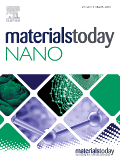
Materials Today Nano
Pioneering Discoveries in Nano-Materials for a Sustainable FutureMaterials Today Nano, published by Elsevier, is a premier academic journal dedicated to the forefront of nano-materials research, encompassing innovations and advancements in biomaterials, condensed matter physics, electronic, optical, and magnetic materials, as well as materials chemistry. With an impressive Q1 ranking across multiple categories, including biomaterials and materials chemistry, this journal serves as a essential platform for researchers, professionals, and students aiming to contribute to and stay informed on cutting-edge developments that push the boundaries of materials science. Its open access model allows for wider dissemination of high-impact findings, ensuring that the research reaches a global audience. Operating from the United Kingdom, Materials Today Nano plays a vital role in fostering interdisciplinary collaboration and advancing scientific understanding in this rapidly evolving field.
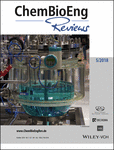
ChemBioEng Reviews
Pioneering Insights in Bioengineering and Chemical EngineeringChemBioEng Reviews is a premier academic journal dedicated to advancing the fields of biochemistry, bioengineering, and chemical engineering. Published by WILEY-V C H VERLAG GMBH, this journal serves as an essential platform for researchers and professionals seeking to disseminate groundbreaking insights and innovations. With a remarkable impact factor and a solid reputation, it is ranked in the top quartile (Q1) across multiple disciplines, including Biochemistry, Bioengineering, and Industrial and Manufacturing Engineering. The journal's comprehensive scope covers the synthesis, analysis, and application of bioengineered solutions, making it a vital resource for anyone involved in process chemistry and technology. With an unwavering commitment to high-quality scientific discourse from 2014 to 2024, ChemBioEng Reviews is not only pivotal for the academic community but also contributes to industry advancements in filtration, separation processes, and the intersection of chemical and biological engineering.

Vietnam Journal of Chemistry
Bridging Knowledge Gaps in Chemical ResearchVietnam Journal of Chemistry, published by WILEY, is a prominent academic journal that serves as a platform for the dissemination of innovative research in the field of chemistry. With its ISSN 0866-7144 and E-ISSN 2572-8288, this journal has made a significant impact on the global scientific community, evidenced by its 2023 Scopus ranking as #274 in the General Chemistry category and a commendable percentile of 32nd. The journal, categorized in the Q3 quartile for miscellaneous chemistry subjects, aims to foster communication among chemists from Vietnam and around the world, encouraging collaboration and the exchange of cutting-edge knowledge. While it currently does not offer Open Access options, the Vietnam Journal of Chemistry is committed to contributing valuable insights from its coverage years spanning from 2018 to 2024, making it a worthy resource for researchers, professionals, and students dedicated to advancing the field of chemistry. Based in the United Kingdom, it stands as a testament to the vibrant research endeavors emerging from Vietnam and beyond.

Emergent Materials
Unveiling the Future of Sustainable Materials.Emergent Materials is a leading journal in the fields of biomaterials, ceramics, composites, and environmental science, published by SpringerNature. With an ISSN of 2522-5731 and an E-ISSN of 2522-574X, this journal serves as a crucial platform for researchers and professionals seeking to publish their findings on innovative materials that drive advancements across various applications. Renowned for its impactful contributions, Emergent Materials currently holds a Q2 ranking in Biomaterials and Waste Management, and a prestigious Q1 ranking in Ceramics and Composites for 2023, showcasing its excellence in these dynamic fields. Positioned within Switzerland, the journal supports a wide array of open access research initiatives, allowing for greater dissemination and accessibility of critical scientific knowledge. Spanning over the years 2018 to 2024, the journal aims to publish groundbreaking studies that address global challenges in sustainability, energy, and material disposal. With an impressive Scopus ranking highlighting its impactful presence, generate compelling insights and stay at the forefront of material sciences with Emergent Materials.

Carbohydrate Polymer Technologies and Applications
Transforming Industries with Carbohydrate Polymer InnovationsCarbohydrate Polymer Technologies and Applications, published by ELSEVIER, is an esteemed open access journal that has been fostering innovation in the field of carbohydrate polymer research since its inception in 2020. With its ISSN 2666-8939, this journal is dedicated to exploring the intersections of analytical chemistry, biochemistry, biotechnology, and materials science, making significant contributions to our understanding of carbohydrate polymers and their diverse applications across various industries. Notably, it has attained a prominent position in various categories, reflecting its quality and impact: ranked Q1 in Analytical Chemistry, Biotechnology, and several Materials Science disciplines, while maintaining strong positions in the Q2 and other quartiles. Additionally, with impressive Scopus rankings—14th in Chemistry (miscellaneous) and 23rd in Analytical Chemistry—it stands at the forefront of scholarly dialogue in these areas, appealing to researchers, professionals, and students alike. The journal's commitment to open access facilitates wider dissemination of knowledge and enhances collaborative research, solidifying its role as a pivotal resource for advancing carbohydrate polymer technologies.
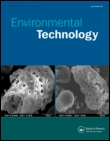
ENVIRONMENTAL TECHNOLOGY
Shaping Tomorrow’s Environmental Practices TodayENVIRONMENTAL TECHNOLOGY, published by Taylor & Francis Ltd, is a prominent journal that serves as a crucial platform for disseminating pioneering research in the multifaceted fields of Environmental Science, Water Science and Technology, and Waste Management. With an impressive record spanning over three decades from 1990 to 2024, the journal holds significant rankings in various categories, including Q3 in Environmental Chemistry and Q2 in both Medicine (miscellaneous) and Water Science and Technology for 2023. Its Scopus rankings further position it within the top tiers of Environmental Science disciplines, reflecting its influence and relevance, particularly as it pertains to pressing global environmental challenges. While the journal does not offer an open access option, it remains dedicated to advancing knowledge and promoting innovative solutions among researchers, professionals, and students engaged in environmental studies. As it continues to attract high-quality submissions, ENVIRONMENTAL TECHNOLOGY plays a vital role in shaping future research and practices aimed at sustainable environmental management.
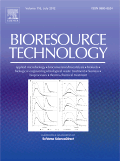
BIORESOURCE TECHNOLOGY
Pioneering the Future of Bioengineering and Resource ManagementBioresource Technology, published by Elsevier Science Ltd, is a leading journal in the fields of bioengineering, environmental engineering, and sustainable resource management. With an impressive impact factor reflected in its Q1 rankings for 2023 across multiple relevant categories, it stands out as a premier source for groundbreaking research from its inception in 1991 to its anticipated contributions through 2024. Bioresource Technology promotes the advancement of technologies and methodologies aimed at the sustainable utilization of biological resources, playing a pivotal role in tackling the challenges of waste management, renewable energy, and environmental protection. Researchers and practitioners are encouraged to contribute and engage with high-quality studies that have significant implications for the global push towards sustainability and innovation. Although the journal does not currently offer Open Access, its subscription model ensures that the rigorous peer-reviewed content remains accessible to those dedicated to advancing the field.